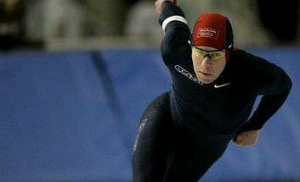
Bruce Conner
Occupation: Airline Captain B-747 United Airlines
Primary Sports: Long Track Ice Speed Skater
Cross Training includes running, cycling, weights, slide-board, yoga, swimming and tennis
My Sporting Career
I competed as a long track ice speed skater from age 12 till 19. I achieved a great deal and won numerous competitions, including being on the US National team from 1974 through 1976. I am faster now by far, at age 56, as a speed skater, than I was as a teenager. I have blown the concept about getting slower as we age, completely out of the water. I have broken down that barrier.
Back in the fall of 1975 I went to The Netherlands to train for the upcoming Olympic trials. I did know anything about tapering before a competition. I ran myself into the ground by working overly hard right up to the competition. My race times were actually slowing down as I approached the trials. I retired from the sport right after the trials and did not put on skates again for 12 years. I did not return to the ice and skating, even for fun, for over 20 years. I was burned out and overtrained. My legs ached everyday for about 18 months after.
After 20 plus years away from the sport, I returned. I had some unfinished business. I was skating only once a week and going faster than I had as a teenager. How fast could I go if trained as hard as I did as a youth and was smarter about it? I decided I wanted to try and make it back to the Olympic trials again at age 49. I was not going to make the team, just the trials. I wanted to continue to go faster than I had ever been before. Was it possible? My answer was, why not! I was realistic about what I could do. I was competing more against myself than for a spot on a team. I just needed to see what I could do. This would be 30 years after I did it the first time. Was it possible? I had to find out.
I have now qualified for the US Olympic trials ages 19, 49, 53, and I am in the process of doing it again at 56. I am skating faster now than I ever have before. I currently hold 4 Masters World Records in my age group. I am a Masters World Sprint Champion.
Overtraining
I have a tendency to overtrain, I know a lot of highly motivated people who do. Being sore is part of the landscape; being tired is also part of my training life. Deep down fatigue is not. When I lose the pop, when I lose my gratitude for the ability to do what I love, that is the difference. My most effective training includes a lot of recovery work.
I have had three distinct times in my life where I have physically overtrained. The first was the 1975 Olympic Trials described above then I did the same thing to a lesser degree just two years ago and had to take 5 weeks off. In this instance I did a lot of weight work and not enough recovery work in between. I am currently recovering from bout of overtraining. I have a coach this time and we are being very aggressive about facilitating my recovery. I tend to go to extremes. It is in my nature, I know that. I have surrounded myself with people and tools that can help me avoid this.
I have used various methods to calculate recovery, including historic training knowledge from myself and my coaches, 3 weeks hard 1 week easy method, one rest day every week, etc. I believe that ithlete will help me achieve my goals this year through validating my rest and recovery.
Using ithlete
I heard about ithlete from a fellow speed skater, looked it up and decided that this was something that might help me decide when to go hard or back off on my training. I’ve been using it for about 6 months now. I have had some illness and stress in my life in that time and my HRV numbers have been pretty low as a result. It reflects all of my life factors including a very high training load.
I work very intensely and am used to high training loads, if I get a low ithlete HRV score I will vary my workouts or do an active recovery day. Now ithlete is telling me my body needs me to slow down I can now take active recovery much easier. I can also take into account my sleep and stress levels. In the past I would train right through these times and believe my racing suffered as a result.
My coach and I plan a taper for racing based on historical norms in speed skating and can now adjust this using ithlete HRV to the optimum level.
In speed skating there is a technical element; I can build the motor but I need technique to apply it to the ice. One of the ways to gauge my readiness to race was my technique and ability to get into a low skating position. If I am not skating well technically and my position is high, then I must be tired and not at my best. When I am rested I skate best, there is a direct relationship. Here is where my coach can give me feedback and ithlete validates that feeling.
